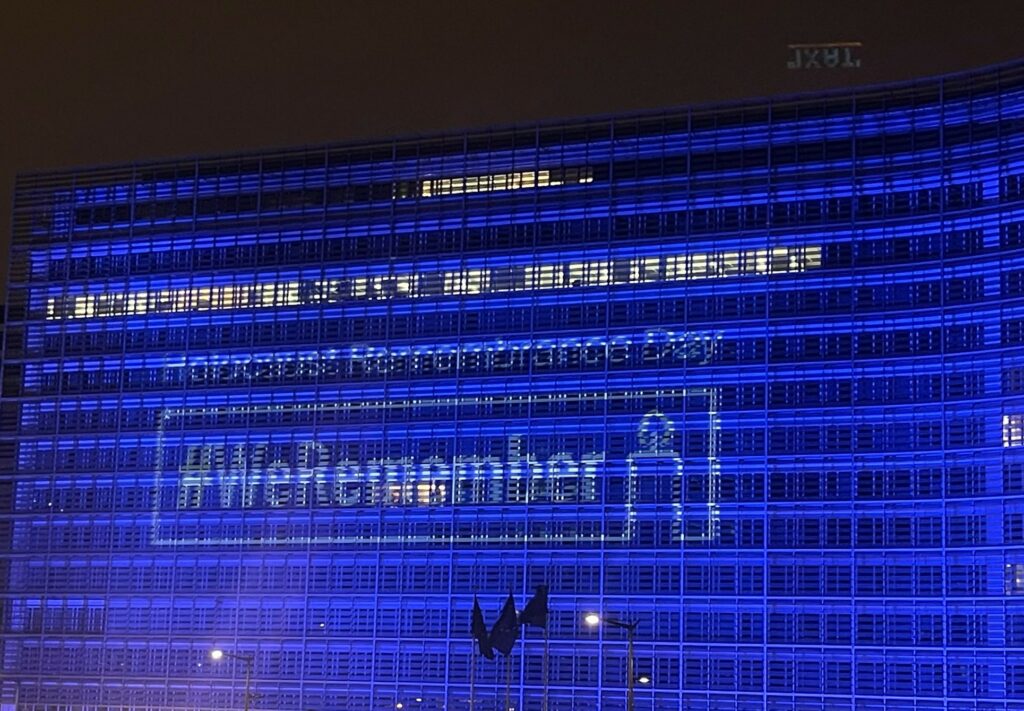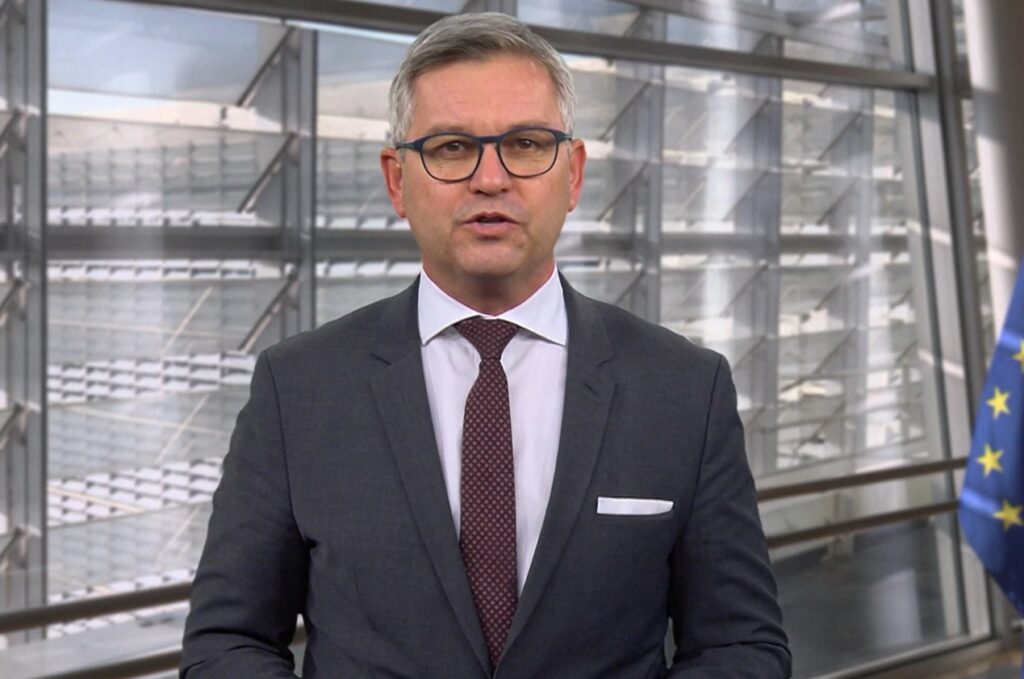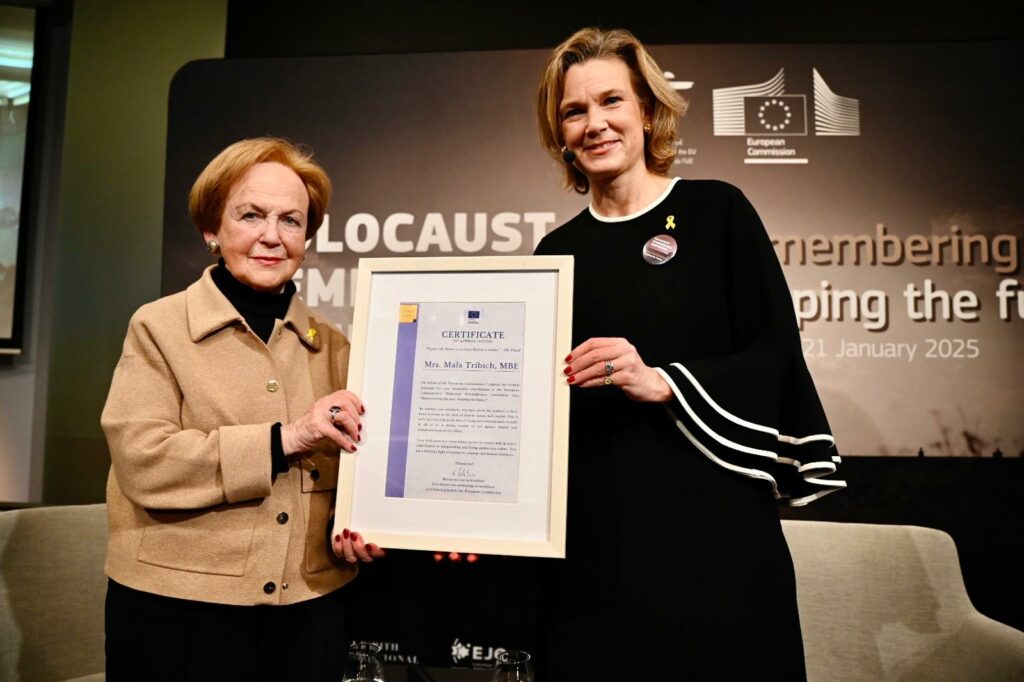The European Commission organized on Tuesday a Holocaust Remembrance Conference in Brussels ahead of the 80th anniversary of the liberation of the Auschwitz-Birkenau extermination camp by the Soviet Red Army on 27 January 1945.
The conference, organized in partnership with the Polish EU Presidency and a number of European-Jewish organisations, was titled “Remembering the Past, Shaping the Future”. The Commission intends also to illuminate the façade of Berlaymont, its headquarters in Brussels, to mark the Remembrance Day.
The annual International Remembrance Day was established by the United Nations in 2005 to commemorate the Holocaust. The day is commemorated each year by the EU institutions. As last year, the day continues to be remembered against the backdrop of a surge in antisemitism in Europe after the 7 October, 2023, terrorist attack on Israel.
The attack was reminiscent of the Holocaust and triggered a devastating war which ended after 15 months last Sunday with a ceasefire-hostage deal between Israel and Hamas. The agreement was welcomed with a deep sense of relief by both sides in the conflict. If fully implemented, it will bring about the release of all Israeli hostages and effectively end the war in Gaza.
“How we commemorate the Holocaust this year will be a litmus test”, said Katharina von Schnurbein, EU’s coordinator on combatting antisemitism and fostering Jewish life in Europe, who opened the conference. She described the ceasefire in Gaza as a new chapter for Israel and the Palestinian people. “We are at a crossroad and must take the right turn to avoid any form of Holocaust distortion.”

The façade of Berlaymont, the headquarters of the European Commission in Brussels, was illuminated on Sunday evening (26 January) to mark the Holocaust Remembrance Day: “We remember”.
Testimony of survivor
Mala Tribich, a 94-year-old Holocaust survivor, gave a moving testimony, which left no listener untouched, about her childhood in Piotrków Trybunalski (Pieterkov), a town in southern Poland, with a vibrant Jewish community of over 10,000 inhabitants or ca 20 % of the total population before the war.
“Everyone who listens to a witness becomes him/herself a witness,” said Katharina von Schnurbein, quoting Holocaust survivor and author Elie Wiesel, in her conversation with Mala. Elie Wiesel was awarded the Nobel Peace Price in 1986.
Mala’s family had soon to move into a ghetto in her hometown, the first one in Nazi-occupied Europe. No-one was safe in the ghetto where regular round-ups took place. The Jews were starved to death or kept alive as forced labour working for the occupying force until most of them were deported to their death in Treblinka in October 1942. Others were taken to a nearby forest and shot.
She endured the harsh reality of life in the ghetto and had to take care of her younger cousins. Some time she was hidden by a Polish family. Throughout the war, she suffered enormously, including separation from her family, and learned about the murder of her mother, sister, and father. She faced many dangers and escaped death narrowly thanks to her resourcefulness or by sheer luck.
At the end of the war, she was deported in cattle wagons to concentrations camps in Germany where she continued to look after her cousin. She still has wonderful memories of the British soldiers who liberated her in Bergen – Belsen. She arrived first in Sweden with a group of surviving children and was afterwards reunited with her brother in England, where she still lives with her family and feels at home.
In England, she worked, studied, and married the love of her life. She devotes her time to tell her first-hand account of the Holocaust and warn against a society without humanity. “Stand up against discrimination in whatever form, don’t be bystanders, and be always on your guard,” she concluded when asked about a word of advice to the young generation.
“As we reflect on this milestone anniversary, let us honor not only the memory of the victims but also the perseverance of the survivors,” commented Dani Dayan, chairman of Yad Vashem, The World Holocaust Remembrance Center in Jerusalem. “Liberation brought immense relief but also marked the beginning of a long and painful struggle of recovery.”

Magnus Brunner, European Commissioner for Internal Affairs and Migration, delivered a video-message on combatting antisemitism to the conference, screenshot
Combatting antisemitism
“Our future and the future of our democracy depends on our collective ability to remember and learn from the past,” said Magnus Brunner, European Commissioner for Internal Affairs and Migration, in a video message to the conference. Referring to the Middle East conflict, he added: “We cannot let conflicts today become an excuse to distort our own history or minimize those darkest times in Europe’s history.”
Magnus Brunner was tasked in his mission letter by Commission President Ursula von der Leyen “to work on the effective implementation, and update as necessary, the EU Strategy on combatting antisemitism and fostering Jewish life".
He has also been tasked to ensure that appropriate tools are in place to support Member States to combat anti-Muslim hatred to improve the safety and security of Muslim communities in Europe and contribute to the update of the Anti-Racism Strategy.
He has witnessed a sharp increase of antisemitism since 7 October. “But we are not in the 1930s,” he said. “Because today the EU and all its EU Member States stand by their Jewish communities."
“To effectively fight antisemitism and foster Jewish life, we need close cooperation with civil society, international partners, and the 27 EU Member States. I’m happy that Poland will soon be the 25th member state with a national strategy.”
“We want to invest in our future and our youth,” the Commissioner added. He thanked the members of Neshama, the EU Network of Young Ambassadors to promote Holocaust remembrance, for their work. Four students read survivor testimonies, among others by Czech-English author H.G Adler, who was deported from Auschwitz to Langenstein-Zwieberge, a forced labour camp in East Germany.
“With the work in this project we hope to give a name to the countless people who suffered in the camps all over Europe and especially in the camp near our hometown,” said Georg Thomas, a history teacher at the local school. “It is our all responsibility that they never be forgotten.”
Secretary of State Władysław Teofil Bartoszewski, at the Polish ministry of foreign affairs, highlighted in his speech the co-existence that had existed during centuries in Poland and the Jewish contribution to the country in all spheres of life until Nazi-Germany’s invasion and the Holocaust. He recalled that the Hebrew word for Poland is Polin, which could mean ‘rest or dwell’ here.
“The 80th anniversary of the liberation of the Auschwitz-Birkenau extermination is not only a moment of remembrance but demands action,” he underlined. “None of us live in a country free of antisemitism.” He confirmed that Poland will accelerate its fight against antisemitism and soon adopt a national strategy. It plans also a number of events in the framework of the EU Presidency.
The EU condemns Holocaust denial and is calling on more focus on education to learn about the Holocaust, keep the memory alive and counter antisemitism. In October 2021, the EU adopted a strategy on combatting antisemitism and fostering Jewish life in Europe which is currently implemented by the member states.
In October last year, the Commission issued its first progress report on the EU strategy with an emphasis on good examples from the Member States. By then, most Member States, with the exception of Belgium, Latvia and Poland, had adopted national strategies, either as alone-standing policies or included in broader strategies against racism and extremism or to promote human rights.
Update: A previous version of the article has been updated.
M. Apelblat
The Brussels Times

